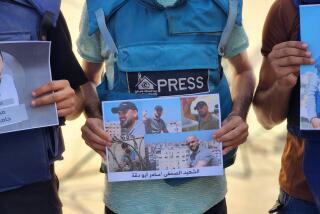COLUMN LEFT : Unlimited Violence Wins Out : In this or any U.S. war, it’s a delusion to think that civilians might be spared.
- Share via
“At the start of the Korean war,” I wrote here a few weeks ago, “U.S. pilots used to throw up in their cockpits as they machine-gunned civilians behind the lines. But before long they settled to the task and, with full public support, mowed down the ‘gooks’ without remit.”
This upset a reader in Los Angeles, who wrote and offered to send $200 to my favorite charity if I could give him credible evidence that U.S. planes intentionally strafed civilians behind the lines early in the war, and that such a policy had the American people behind it.
What does this reader think? That Americans don’t kill people in wars unless they are clearly labeled “enemy soldier”? Or that Americans don’t mow down defenseless targets while the folks back home cheer them on?
His indignation at these unwelcome truths about the Korean war makes me think that 30 years from now there will be similar astonishment at news that Americans in the Gulf War dropped high explosives and missiles on Iraqi civilians, or that an American President deliberately prolonged this war so that pilots could dump cluster bombs on a beaten and fleeing foe that had for five days been desperately calling for a cease-fire.
President Bush is telling his fellow citizens to be “fiercely proud” of the servicemen and women in the Gulf. But the moral climate would be a lot more wholesome if people were also fiercely aware of how much killing had to be done so that Bush could boast that the nation had put the “Vietnam syndrome” behind it.
We’ll never know precisely how many Iraqi civilians and soldiers died. A prudent estimate from one journalist in Iraq is 7,000 to 10,000 civilians killed in bombings. But diseases stemming from smashed sewage and water systems will account for many more. For Iraqi soldiers the estimates have run from 50,000 to 100,000 dead. As with the invasion of Panama, reporters were kept away while the bodies were bulldozed into shallow graves.
Many of the dead were victims of weapons about whose use scarcely a whisper was raised. Back in September, the Pentagon leaked a story that, unlike the United States, Iraq had fuel-air bombs that were near-nuclear in destructive capacity. In fact, Iraq never used them, but the United States did, and few raised a murmur. Nor was there much fuss about the carnage on the road north to Basra after Iraq had agreed in Moscow to an unconditional withdrawal from Kuwait.
“The glee,” wrote Colin Hughes in the British Independent (a newspaper that strongly supported the war) “with which American pilots returning to their carriers spoke of the ‘duck shoot’ presented by columns of Iraqis retreating from Kuwait City (has) troubled many humanitarians who otherwise supported the allied objectives.” From the U.S. carrier Ranger, Randall Richard of the Providence Journal reported pilots so keen to get back in the air that “their preferred weapon--the Rockeye cluster bomb--was being passed up because elevators were too slow getting them up to the flight deck.” Each Rockeye bomb disperses 247 bomblets designed for “soft” targets, otherwise known as people.
Later, on that same road to Basra, the BBC’s Stephen Sackur described the incinerated and mangled dead who had been trying to get home. Among them were civilians, including contract workers from the Indian subcontinent. Sackur reported seeing the Bombay labels on their suitcases. Also victims were Palestinians fleeing the indiscriminate fury of the Kuwaitis.
From his eminence atop all the dead Iraqis, with whom he proclaimedly had “no quarrel,” President Bush now proclaims “Vietnam syndrome” has been licked at last. The real message is the lessons of Vietnam have been unlearned, and that what pays most is the exercise of violence without limit.
Let me give the questioning reader a quotation from Capt. Walter Karig’s “Battle Report” (1952) in which an officer describes the use of air power in Korea during the summer of 1950: “ ‘So, we killed civilians, friendly civilians, and bombed their homes; fired whole villages with the occupants--women and children and 10 times as many hidden communist soldiers--under showers of napalm, and the pilots came back to their ships stinking of vomit twisted up from their vitals by the shock of what they had to do!’ ” There was public support at home for this, just as there was public support for the bombing of the shelter in Baghdad.
So I ask that a check be sent for $200 to the International Committee of the Red Cross, 780 First Avenue Suite 2802 New York, NY 10017, marked “Assistance for Victims of the Gulf War.”
More to Read
Sign up for Essential California
The most important California stories and recommendations in your inbox every morning.
You may occasionally receive promotional content from the Los Angeles Times.













